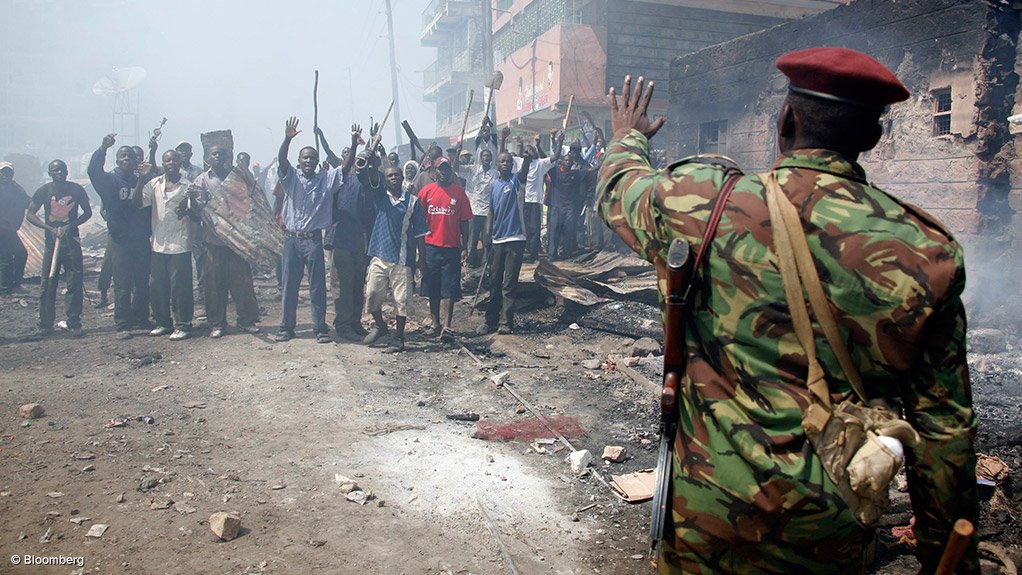West Africa fraught with challenges in tough mining times



UNREST Factors such as war, social unrest or hardship are all indicative of a somewhat unstable political environment, which, in turn, negatively impacts on the attractiveness of certain economies
Photo by Bloomberg
LOVELYN BASSEY There is still strong consensus on the colossal potential for new markets to emerge across Africa
While political instability, corruption and the global commodities price crunch have had adverse effects on the West African mining sector, other factors such as a lack of infrastructure, power shortages and inconsistency, and a lack of transparency in terms of regulatory policy, as well as unattractive tax policies, remain problematic for mining companies operating in the region.
West Africa, which will hold the biennial West Africa Mining & Power Exhibition, in Accra, Ghana, from June 1 to 3, is known for hosting deposits of platinum, gold, diamonds, chromite, manganese, and vanadium and has attracted investment from mining companies, such as gold mining giant AngloGold Ashanti and Ukranian business group Privat.
“Africa’s governments, in general, will play a major role in shaping the future mining environment on the continent and, as such, fighting corruption must be one of their top priorities along with the improved management of resource exploitation, the attraction of foreign investment and increasing deals flow,” avers Pan-African arbitration and commercial litigation law firm, with clients in West Africa, Centurion Law Group director Lovelyn Bassey.
But still, she stresses the need for mining companies operating in Africa to build an understanding of the African mining jurisdictions and operating environments in which they operate, as this could lead to better performance on the continent.
“In Africa, there are 54 countries with infinite differences in legal, political, infrastructure and investment structures. Therefore, a deep and fundamental understanding of the jurisdiction in which mining companies are operating is critical for success. Investors need to appreciate that the risk is not equal across Africa,” she adds.
Bassey highlights that one of the most pressing issues in the African mining sector remains the government and political stability of African countries. She notes that the durability and integrity of government regimes are essential to the mitigation of political risk.
Factors such as war, social unrest or hardship are all indicative of a somewhat unstable political environment, which, in turn, negatively impacts on the attractiveness of certain economies and, in the broader sense, the ease with which companies can do business in these countries.
“There is still strong consensus on the colossal potential for new markets to emerge across Africa, but optimism is tempered by concerns over political stability, security and the integrity of essential State functions, such as healthcare, a case in point being the recent outbreak of Ebola in West Africa,” Bassey says.
While there has been political unrest in countries, such as Gambia and Burkina Faso, in recent years, she maintains that Nigeria, after the apparent ‘seamless’ transition of government last year, remains a good example that African leaders across the continent are committed to development and reform. Bassey adds that African governments know that investors will balance risk and return on investment, and that stability is key.
“The most important concern for any investor is predictability and stability. Mining companies need to be aware and plan ahead to have a clear exit strategy, if need be. It is imperative to look out for and identify threats and potential risks, and plan accordingly.”
Bassey explains that, along with political instability, corruption remains an ever-present factor that continues to plague the mining sector in West Africa.
“Corruption has emerged as one of the leading concerns in policy developments and profound political factors undermine efforts to fight corruption and achieve greater transparency in the extractive industries. We notice corruption flourishing where access to information is limited and revenue flows lack transparency.”
Centurion notes that corruption often occurs at the time of the awarding of a mining title, during the operation of the mine or the export of its product.
“Awards and allocations of research contracts are done in such a manner as to benefit political regimes rather than the nation as a whole. Centurion has observed the existence of nominee companies, which are granted most mine-related projects. These are cronies of the regimes who are able to generate the most money and will consume the largest slice of the cake.
“The principal actors perceived as the most corrupt in the mining sector are, among others, local officials at the mining sites, executives of mining companies, authorities issuing operating licences or the buying of minerals, ministers, directors and agents,” Bassey states.
The global commodities crunch has added to Africa’s precarious position, as foreign invest-ment has started to slow, causing national debt levels to rise on the continent.
Bassey notes that mining companies are struggling to recalibrate and they face a host of challenges, from tumbling demands and declining minerals grades to increasing stakeholder expectations, which will lead to an eventual decline in business in Africa.
She points out that Africa remains largely untapped and underexplored and presents investors with some excellent global investment opportunities.
“The mining industry is of strategic import-ance to Africa, as minerals contribute greatly to African countries’ gross national product, employment and foreign investments from mineral exports.
“Of the 54 countries in Africa, 24 rely on rela-tively few mineral products to generate more than 75% of their export earnings,” Bassey comments.
She notes that, while the African Development Bank forecast last year February that Africa’s natural resources would contribute more than $30-billion a year to the revenues of its governments by 2033, countries still face an array of challenges, influencing the development of the African mining sector.
Article Enquiry
Email Article
Save Article
Feedback
To advertise email advertising@creamermedia.co.za or click here
Press Office
Announcements
What's On
Subscribe to improve your user experience...
Option 1 (equivalent of R125 a month):
Receive a weekly copy of Creamer Media's Engineering News & Mining Weekly magazine
(print copy for those in South Africa and e-magazine for those outside of South Africa)
Receive daily email newsletters
Access to full search results
Access archive of magazine back copies
Access to Projects in Progress
Access to ONE Research Report of your choice in PDF format
Option 2 (equivalent of R375 a month):
All benefits from Option 1
PLUS
Access to Creamer Media's Research Channel Africa for ALL Research Reports, in PDF format, on various industrial and mining sectors
including Electricity; Water; Energy Transition; Hydrogen; Roads, Rail and Ports; Coal; Gold; Platinum; Battery Metals; etc.
Already a subscriber?
Forgotten your password?
Receive weekly copy of Creamer Media's Engineering News & Mining Weekly magazine (print copy for those in South Africa and e-magazine for those outside of South Africa)
➕
Recieve daily email newsletters
➕
Access to full search results
➕
Access archive of magazine back copies
➕
Access to Projects in Progress
➕
Access to ONE Research Report of your choice in PDF format
RESEARCH CHANNEL AFRICA
R4500 (equivalent of R375 a month)
SUBSCRIBEAll benefits from Option 1
➕
Access to Creamer Media's Research Channel Africa for ALL Research Reports on various industrial and mining sectors, in PDF format, including on:
Electricity
➕
Water
➕
Energy Transition
➕
Hydrogen
➕
Roads, Rail and Ports
➕
Coal
➕
Gold
➕
Platinum
➕
Battery Metals
➕
etc.
Receive all benefits from Option 1 or Option 2 delivered to numerous people at your company
➕
Multiple User names and Passwords for simultaneous log-ins
➕
Intranet integration access to all in your organisation




















